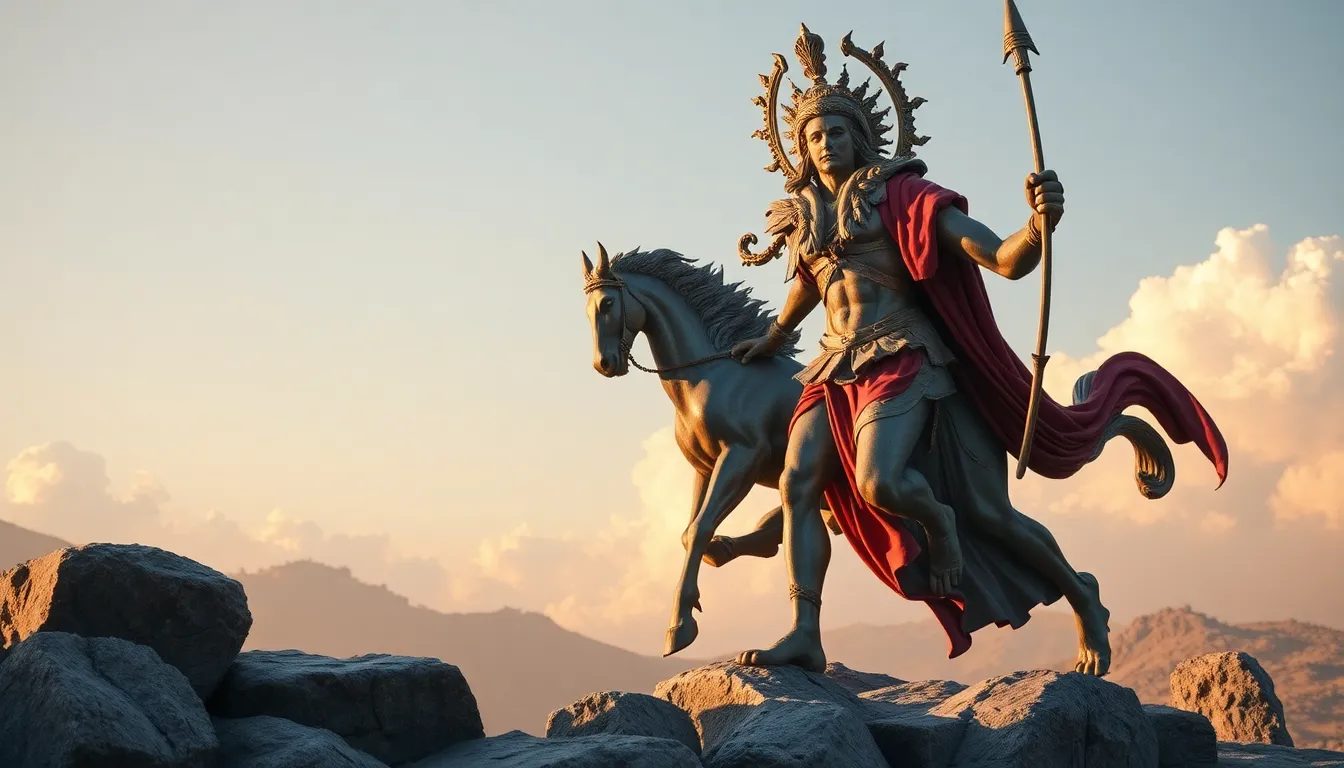The Connection Between Divine Retribution and Heroism in Greek Myths
I. Introduction
Greek mythology is rich with stories that explore the intricate relationship between divine retribution and heroism. Divine retribution, often seen as the punishment inflicted by the gods on mortals for their transgressions, serves as a crucial aspect of these myths. Heroism, on the other hand, embodies the courage and exploits of individuals who navigate challenges and confront divine forces. This article aims to delve into the interplay between these two concepts, illustrating how they shape the narratives within Greek mythology.
II. The Concept of Divine Retribution in Greek Mythology
Divine retribution in Greek mythology refers to the punishment that deities mete out to mortals for their hubris, wrongdoings, or transgressions against the natural order. This concept is significant as it underscores the belief that the gods are deeply involved in human affairs, ensuring that justice is served.
Key examples of gods dispensing justice include:
- Zeus: Often acts as the arbiter of justice, punishing mortals who defy divine laws.
- Nemesis: The goddess of retribution, specifically punishing excessive pride and arrogance.
- Athena: Plays a role in guiding heroes while also ensuring they respect the will of the gods.
The moral framework of retribution in ancient Greek society was based on the belief that maintaining balance and order was essential. This belief instilled a sense of duty among mortals to adhere to the gods’ will, for failing to do so could lead to dire consequences.
III. The Role of Heroes in Greek Myths
Heroes in Greek mythology are characterized by their extraordinary abilities, bravery, and often a tragic flaw. They embark on epic journeys filled with trials that test their strength, wit, and moral fiber.
The journeys faced by Greek heroes often include:
- Facing monstrous adversaries and overcoming insurmountable odds.
- Encountering divine beings who may assist or hinder their progress.
- Enduring personal sacrifices for the greater good of society.
The impact of heroic deeds on society and culture is profound. Heroes often serve as symbols of virtue and resilience, inspiring generations through their stories. Their actions not only define their legacies but also reflect the values and beliefs of the cultures that recount their tales.
IV. Case Studies of Heroes and Divine Retribution
Several notable myths exemplify the connection between heroes and divine retribution. These case studies highlight how divine consequences shape the narratives of heroism.
A. The story of Prometheus and the consequences of defiance
Prometheus, the Titan who defied Zeus by stealing fire and giving it to humanity, exemplifies the theme of divine retribution. As punishment for his transgression, Zeus had him bound to a rock, where an eagle would eat his liver daily, only for it to regenerate each night. This story illustrates the severe consequences of defying divine authority and the sacrifice involved in championing humanity.
B. The tale of Hercules and his labors as a response to divine punishment
Hercules, the quintessential hero, faced twelve arduous labors as a form of penance for killing his wife and children in a fit of madness, induced by Hera. Each labor not only tested his strength and resolve but also served as a means of atonement for his past actions. Hercules’ journey exemplifies how divine retribution can lead to heroic transformation and redemption.
C. The fate of Achilles and the wrath of the gods
Achilles, the greatest warrior in the Trojan War, faced divine retribution through the wrath of Apollo, who struck him down with a deadly arrow. His story reflects the fragility of human glory in the face of divine will, highlighting the theme that even the mightiest heroes are subject to the whims of the gods.
V. The Interplay Between Heroism and Divine Retribution
The interplay between heroism and divine retribution is a central theme in Greek myths. Heroes often confront divine forces, either to fulfill their destinies or to seek vengeance for injustices.
The concepts of atonement and redemption are prevalent, as heroic actions frequently serve as a means to rectify past mistakes. This dual role of heroes as both agents of change and subjects of divine will adds depth to their narratives, emphasizing the complexity of their journeys.
VI. The Influence of Divine Retribution on Heroic Narratives
Divine retribution significantly shapes the hero’s journey and motivations. The consequences of defying or pleasing the gods often drive the plot and character development within heroic tales.
Key narrative elements include:
- Divine intervention, which alters the course of a hero’s journey.
- The moral dilemmas faced by heroes as they navigate divine expectations.
- The eventual realization of the fragility of human agency in the face of divine authority.
These elements underscore the tension between human ambition and divine authority, a recurring theme in Greek mythology.
VII. The Cultural Legacy of Divine Retribution and Heroism
The themes of divine retribution and heroism resonate deeply in modern literature and media. They continue to appear in various forms, from classic literature to contemporary films and novels.
The continued relevance of Greek myths lies in their ability to provide insights into human nature, morality, and justice. The archetypes of heroes and the divine serve as timeless reflections of societal values and struggles.
VIII. Conclusion
In summary, the relationship between divine retribution and heroism is a foundational aspect of Greek mythology. The interplay between these themes highlights the complexities of human existence, the pursuit of justice, and the moral lessons embedded within these ancient tales.
As we explore the rich tapestry of Greek myths, we find valuable insights into the nature of morality and the consequences of both heroic and unheroic actions. These narratives invite us to reflect on our own lives and the moral implications of our choices, urging further exploration of the timeless stories that continue to shape our understanding of justice and heroism.




